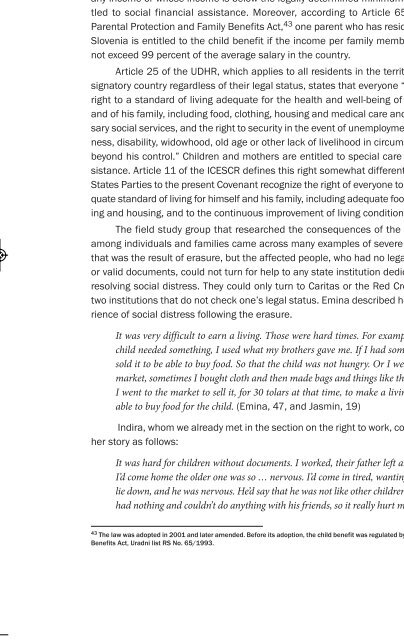The Scars of the Erasure_web
The Scars of the Erasure_web
The Scars of the Erasure_web
- No tags were found...
Create successful ePaper yourself
Turn your PDF publications into a flip-book with our unique Google optimized e-Paper software.
<strong>Erasure</strong>_4a 10.1.11 20:29 Page 129THE ERASURE AS A VIOLATION OF LEGALLY PROTECTED HUMAN RIGHTS129as well as <strong>the</strong> majority <strong>of</strong> o<strong>the</strong>r countries, through <strong>the</strong> right to social financial assistanceand child benefit. Social financial assistance and child benefit are <strong>the</strong>types <strong>of</strong> income that are not tied to previous insurance or contributions paid. InSlovenia, every person with permanent residence in Slovenia who does not haveany income or whose income is below <strong>the</strong> legally determined minimum, is entitledto social financial assistance. Moreover, according to Article 65 <strong>of</strong> <strong>the</strong>Parental Protection and Family Benefits Act, 43 one parent who has residence inSlovenia is entitled to <strong>the</strong> child benefit if <strong>the</strong> income per family member doesnot exceed 99 percent <strong>of</strong> <strong>the</strong> average salary in <strong>the</strong> country.Article 25 <strong>of</strong> <strong>the</strong> UDHR, which applies to all residents in <strong>the</strong> territory <strong>of</strong> asignatory country regardless <strong>of</strong> <strong>the</strong>ir legal status, states that everyone “has <strong>the</strong>right to a standard <strong>of</strong> living adequate for <strong>the</strong> health and well-being <strong>of</strong> himselfand <strong>of</strong> his family, including food, clothing, housing and medical care and necessarysocial services, and <strong>the</strong> right to security in <strong>the</strong> event <strong>of</strong> unemployment, sickness,disability, widowhood, old age or o<strong>the</strong>r lack <strong>of</strong> livelihood in circumstancesbeyond his control.” Children and mo<strong>the</strong>rs are entitled to special care and assistance.Article 11 <strong>of</strong> <strong>the</strong> ICESCR defines this right somewhat differently: “<strong>The</strong>States Parties to <strong>the</strong> present Covenant recognize <strong>the</strong> right <strong>of</strong> everyone to an ade -quate standard <strong>of</strong> living for himself and his family, including adequate food, clothingand housing, and to <strong>the</strong> continuous improvement <strong>of</strong> living conditions.”<strong>The</strong> field study group that researched <strong>the</strong> consequences <strong>of</strong> <strong>the</strong> erasureamong individuals and families came across many examples <strong>of</strong> severe povertythat was <strong>the</strong> result <strong>of</strong> erasure, but <strong>the</strong> affected people, who had no legal statusor valid documents, could not turn for help to any state institution dedicated toresolving social distress. <strong>The</strong>y could only turn to Caritas or <strong>the</strong> Red Cross, <strong>the</strong>two institutions that do not check one’s legal status. Emina described her experience<strong>of</strong> social distress following <strong>the</strong> erasure.It was very difficult to earn a living. Those were hard times. For example, if mychild needed something, I used what my bro<strong>the</strong>rs gave me. If I had something, Isold it to be able to buy food. So that <strong>the</strong> child was not hungry. Or I went to <strong>the</strong>market, sometimes I bought cloth and <strong>the</strong>n made bags and things like that. <strong>The</strong>nI went to <strong>the</strong> market to sell it, for 30 tolars at that time, to make a living. To beable to buy food for <strong>the</strong> child. (Emina, 47, and Jasmin, 19)Indira, whom we already met in <strong>the</strong> section on <strong>the</strong> right to work, continuedher story as follows:It was hard for children without documents. I worked, <strong>the</strong>ir fa<strong>the</strong>r left and whenI’d come home <strong>the</strong> older one was so … nervous. I’d come in tired, wanting only tolie down, and he was nervous. He’d say that he was not like o<strong>the</strong>r children, that hehad nothing and couldn’t do anything with his friends, so it really hurt me. […] If43 <strong>The</strong> law was adopted in 2001 and later amended. Before its adoption, <strong>the</strong> child benefit was regulated by <strong>the</strong> FamilyBenefits Act, Uradni list RS No. 65/1993.


